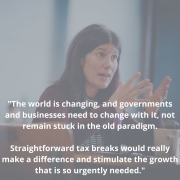Having real teeth: A taxing issue
I’m not talking about dentists or crowns (although we do have a brilliant Mark Holder in Peninsula Dental that does this!), rather tax breaks for social enterprises and businesses that can prove they are achieving a better world through their business model.
We can help prove and evidence this as all of our social enterprise accreditations independently verify that the business is led by social and environmental objectives rather than shareholder gain, and therefore could be used to help identify such businesses where tax breaks are applicable. In this blog I examine why we now urgently need this bold step.
Many political parties claim to want more businesses that are truly ‘purpose led’ but have not backed it up with specific policy or legislation. The world is changing, and governments and businesses need to change with it, not remain stuck in the old paradigm. Straightforward tax breaks would really make a difference and stimulate the growth that is so urgently needed.
The UK Government has consistently resisted the provision of simple fiscal incentives for specific types of company, preferring to remain agnostic on structure despite evidence that social enterprises contribute so much to the economy as well as tackling social and environmental issues. The sole recent tax relief aimed at social enterprises in England (which is now finished) was Social Investment Tax Relief (SITR), which was aimed at investors rather than for the business itself and was largely irrelevant to most social enterprises as they can’t take equity investment (not to mention it was complicated to administer and understand).
Rather than incentivise certain beneficial types of company that help deliver policy objectives, the orthodoxy is that the market will provide outcomes and investment due to the profit motive. The profit driver above all other considerations comes at a cost to non-financial outcomes. The time has come for all parties to challenge this orthodoxy, particularly in delivery of goods and services that people depend upon for their daily lives.
The current scandal around water companies perfectly illustrates why we need governments to incentivise in the right way. Currently, financial rewards are reaped for those that asset strip in the name of higher dividends – ignoring the social and environmental consequences of not investing in these aspects of the business. There have been other recent well-known cases often led by private equity firms making quick returns at the expense of long-term stability and reinvestment in staff and infrastructure.
From privatisation to profits: How providing clean water became a murky business https://t.co/xqVUroJC2o
— Sky News (@SkyNews) June 28, 2023
‘Shareholder primacy’ as it’s known, is also one of the relatively undiscussed but key reasons that the UK is facing relatively high levels of stagnation and inequality according to a briefing by the Common Wealth Think Tank. The researchers have noted that it leads to behaviours that are much more pronounced in the UK – i.e. extracting larger shareholder payouts rather than investing in the workforce and the company, which leads to lower productivity. Their research finds that there is a correlation between democratic governance and higher levels of investment within the business. The pressure from financial markets to ‘disgorge cash’ has impact on both investment and thus sustainable growth.
🚨 NEW: The UK ranks third worst in Europe for employee participation rights 🚨 @DantonsHead and @KhemRogaly analysis finds that where economic democracy is strongest, economies perform best; where it is weak, they perform poorly. https://t.co/gtFWdHjEbs pic.twitter.com/NBtpCqedxy
— Common Wealth (@Cmmonwealth) March 24, 2023
Governance (i.e. the set of rules about how the company is set up) is an essential part of being ‘purpose led’. How can you have a business that extracts as much dividend and equity for shareholders as possible yet claims to be driven by social and environmental purpose? In the UK, the main stakeholder tends to be the shareholder – with relatively low priority being given to others such as the local community, employees and the environment.
Many political parties claim to want more businesses that are truly ‘purpose led’ but have not backed it up with specific policy or legislation. The world is changing, and governments and businesses need to change with it, not remain stuck in the old paradigm. Straightforward tax breaks would really make a difference and stimulate the growth that is so urgently needed. We will be lobbying parties for this change with our social enterprise partners on the Business Plan for Britain campaign. Watch this space!
If you are interested in accrediting your business to show your ethical and purposeful social enterprise credentials, you can register your interest here. You can also take our short online quiz to quickly identify if your business is eligible.
If you would like to keep up to date with our latest news please sign up for our newsletter.






Leave a Reply
Want to join the discussion?Feel free to contribute!